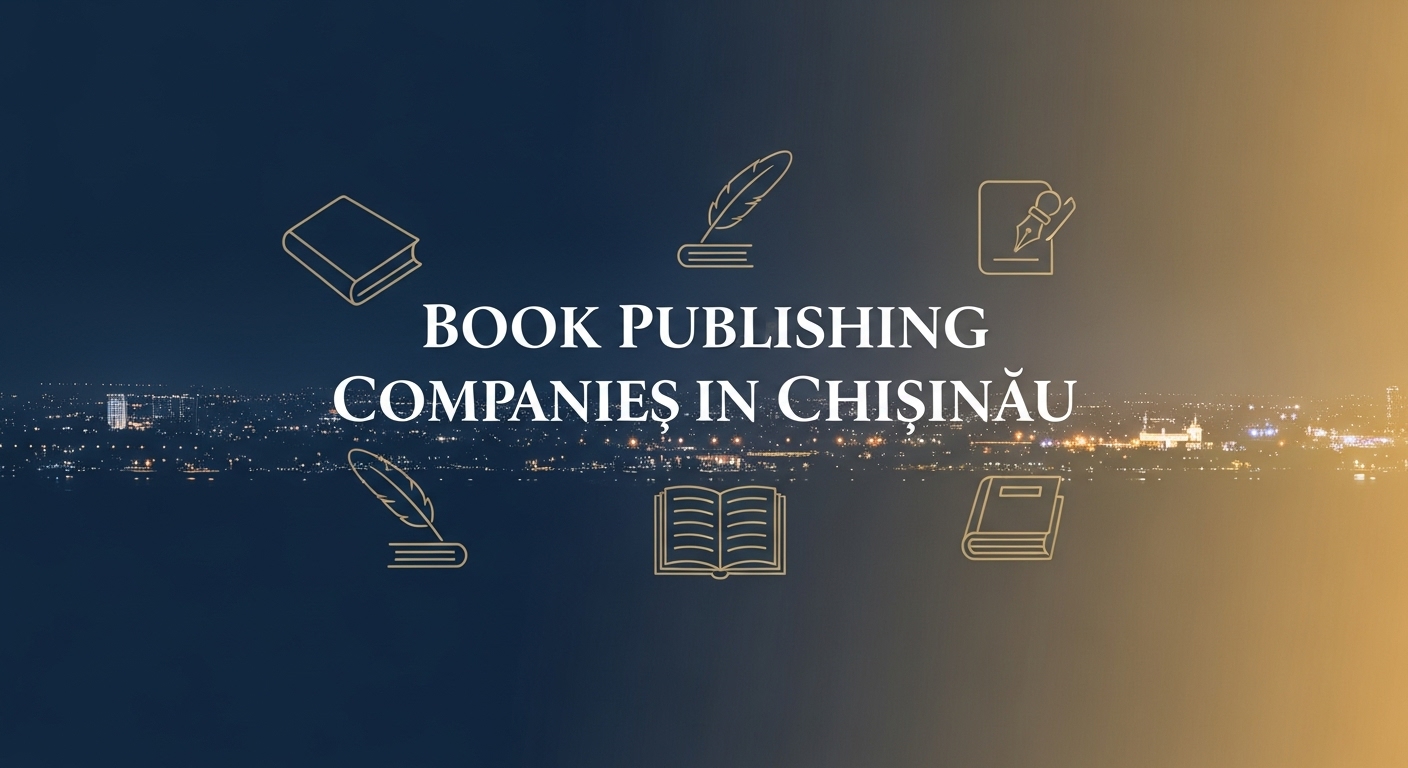
Chișinău remains the cultural heart of the Republic of Moldova, where a compact but diverse publishing scene supports literary fiction, academic works, children’s books, and practical titles. In 2025 the local market blends traditional houses with smaller independent presses and hybrid author-services firms; whether you’re an emerging writer or an academic, Chișinău offers a range of partners that cover editing, design, print and local distribution.
1. Barnett Ghostwriting
Barnett Ghostwriting is an international author-services provider that also positions itself as a partner for Moldovan authors seeking development, editorial and publishing support. While not a traditional, long-standing Chișinău imprint in the classic sense, Barnett appears in contemporary lists of publishers serving Moldova because it offers end-to-end services that many local authors use to reach regional and international markets.
- Main strengths: manuscript development, ghostwriting, copyediting and project management for publication.
- Typical author fit: writers who want hands-on project support and hybrid publishing pathways rather than a purely traditional editorial route.
- Practical note: authors should confirm the exact terms (royalties, rights, production costs) before committing—service firms and traditional presses use very different business models.
2. Generis Publishing
Generis is a Chișinău-based imprint active in printing and distributing both print books and e-books. It characterizes itself as a local publisher with commercial distribution channels and has an established presence in city directories and local listings.
- Main strengths: practical production and digital distribution, responsiveness to commercial projects.
- Typical author fit: writers seeking straightforward production and regional distribution.
- Practical note: check sample titles and recent publication dates to judge editorial fit.
3. Eliva Press
Eliva Press positions itself as a specialized house for academic and scientific titles, offering editorial support and services designed to help researchers and academics publish accessible, peer-oriented work. Their public-facing materials emphasize editorial support and author services tailored to scholarly output.
- Main strengths: academic editorial workflows, support for monographs and textbooks, structured editorial review processes.
- Typical author fit: academics, researchers, and professionals with scholarly manuscripts or course materials.
- Practical note: university-affiliated authors should verify whether the press offers indexing, ISBN registration, and distribution in academic channels.
4. CARTEA S.A.
CARTEA is a long-standing commercial publishing and book-trade entity in Chișinău, historically active in retail and publishing activities. Company records and local directories list CARTEA as one of the larger and more established organizations that combine retail operations with editorial activity.
- Main strengths: retail distribution strength, experience in book trade logistics and broader availability in local stores.
- Typical author fit: authors who want strong local visibility and traditional retail placement.
- Practical note: retail-oriented publishers often favour titles with clear local or commercial appeal.
5. Editura ARC
Editura ARC is an active Chișinău publisher with a visible catalog and storefront presence in the city. The house publishes a mix of fiction, non-fiction and children’s books and maintains a local contact address and catalog for readers.
- Main strengths: balanced catalogue spanning general interest and literary titles, local marketing activities.
- Typical author fit: fiction and general nonfiction writers seeking a well-rounded, city-based publisher.
- Practical note: meet with editorial staff if possible to gauge how a project would be handled editorially and promoted locally.
6. Editura Prut
Editura Prut is known in Moldova for educational and children’s titles and is based in Chișinău. The press has a history of publishing school resources, children’s literature and locally relevant educational material, making it a mainstay for families and schools.
- Main strengths: textbooks, children’s literature and educational resources.
- Typical author fit: authors of pedagogical material, children’s authors and educational content creators.
- Practical note: if your manuscript is educational, enquire about adoption processes, sample chapters, and relationships with schools.
7. Editura Știința
Editura Știința operates at the intersection of academic and general-interest publishing, often connected to university events and scholarly launches. It publishes scientific works, cultural titles, and participates in local literary events.
- Main strengths: academic titles, conference-related publications and works tied to higher education.
- Typical author fit: scholars, lecturers and researchers with a need for local academic distribution.
- Practical note: academic presses may require peer review or faculty endorsements—prepare an academic CV and references.
8. Editura Cartier
Editura Cartier is a Chișinău-based independent press active since the 1990s, focusing on literary fiction, poetry, history and essays. It is recognized domestically for carefully curated literary projects and for publishing authors with strong regional voices.
- Main strengths: literary curation, poetry and literary fiction, editorial care for culturally significant works.
- Typical author fit: literary writers, poets and essayists seeking a publisher with literary sensitivity.
- Practical note: literary presses often receive many submissions—follow submission guidelines and prepare a concise cover letter and sample chapters.
9. Editura Prut / Independent & Regional Houses
Beyond the named houses above, Chișinău’s ecosystem includes smaller independent presses and regional houses that specialize in niche areas—children’s books, regional history or poetry. These smaller publishers are an important channel for voices that are locally rooted but may not fit the commercial profile of larger companies. (Examples in the market include smaller imprints and municipal or university-associated publishers available via local directories.)
- Main strengths: local knowledge, genre specialization, community networks.
- Typical author fit: niche projects, vernacular literature, local history and cultural works.
- Practical note: smaller presses can be ideal for culturally specific projects, but ask about print runs and distribution reach up front.
10. Hybrid & Service-Oriented Options
Chișinău’s book market also includes hybrid models—printing houses, distribution partners and author-services firms—that help writers self-publish or pursue a hybrid route between full self-publishing and traditional contracts. Authors often use these services for higher control over design and rights while still accessing professional production.
- Main strengths: flexibility, faster turnaround, tailored marketing packages.
- Typical author fit: authors who want control over rights and publishing timelines, or those who prefer to invest in production and distribution rather than relinquish rights.
- Practical note: read contracts carefully; hybrid and service providers vary widely in pricing and rights structures.
Quick tips for authors choosing a Chișinău publisher
- Define your goal first. Do you want local retail visibility, academic indexing, or global e-book distribution? The right partner depends on that decision.
- Ask about rights and royalties. Clarify territory, language rights, and whether the publisher requires exclusivity.
- Request a sample contract. Compare the contract clauses on royalties, reprint rights, subsidiary rights (translations, audio), and termination.
- Check recent titles. A publisher’s last two years of releases will show whether they actively publish in your genre.
- Meet the editor if possible. A short conversation about your project can reveal fit faster than pages of web copy.
- Budget for marketing. Even reputable houses expect authors to be involved in promotion—plan for readings, events, and social media.
Closing paragraph
Chișinău’s publishing landscape in 2025 balances established trade houses, literary imprints, academic presses and growing hybrid/service providers. This mix gives authors options—traditional editorial routes for those seeking prestige and retail reach, and hybrid or service-oriented models for writers who want control and speed. When evaluating any partner, prioritize clarity on editorial process, rights, distribution and costs; a strong working relationship and transparent contract typically matter more to long-term success than the label on the spine.





